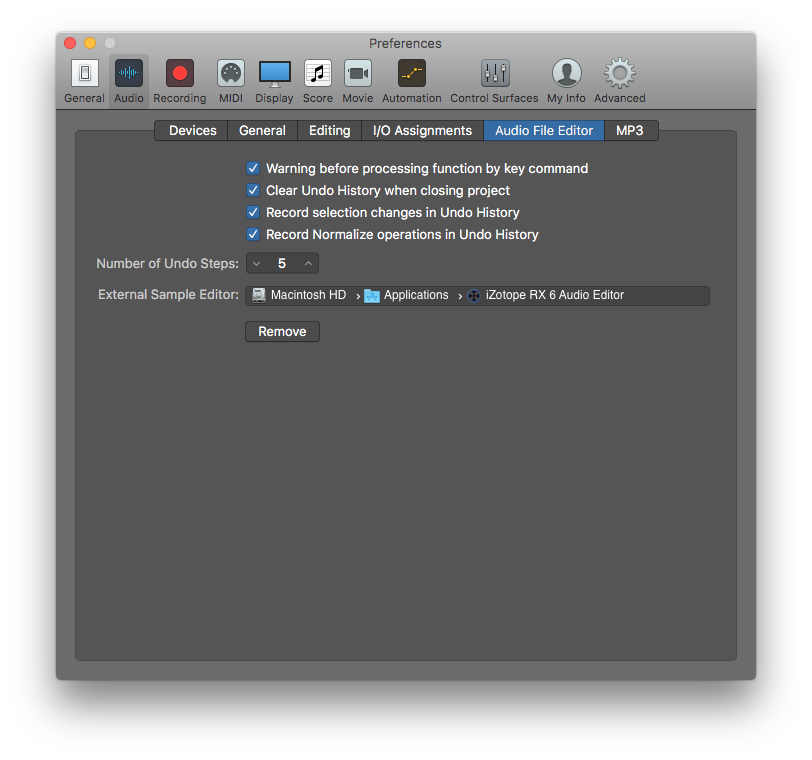In essence, what I’m talking about is establishing a reference listening level in the control room, to use as a reliable base from which to make aural decisions. The good news is that this is very simple to achieve, and doesn’t require any major investment in new equipment, although it’s certainly easier and more intuitive if you have a well‑designed monitor controller and a simple SPL meter.
Today was a good day to re-calibrate the studio monitors.
The mains are JBL LSR305, waveguide at ear level. On top of those are the M-Audio AV40 pair (serve well for typical people listening, no bottom to speak of).
The room is 3.2m wide, 4.4m long, 2.4m tall — I calculate a tad more than 34 cubic meters. The suggested reference level is 74 dB.
Fired up Logic with pink noise at -20 db, pushed the outputs to 0, measured on my trusty iPhone SPL meter (been using it for 4 years, I trust it).
I put a Behringer Monitor2USB monitor controller into the audio path about a year or so ago. Volume knob is top-dead-center — marked 50.
73.9 dB on the LSR 305, 71 dB on the AV40. The JBL volume is excellent. Nudged the AV40 volume knob a bit past TDC and got to 74 dB. OK.
All of this is run through IK Multimedia ARC 2 room correction software. I AudioHijack the system output and send it through the plugin. Separate settings for the AV40, JBL Main, and JBL Center. Center is a tighter pattern right in front of the monitor, with Main being measured 4 feet from the monitors in a pattern for 2-3 people listening.
Master audio output from the Mac is set to -13.5 dB which gets me music playing at about 74-76 dB all the time.
Right now I’m running the Apple Music playlist “Classic Acoustic” for some change of pace. Normally I will play my “Mix Test” playlist to test the world.
The Blues Walk Lyle Lovett and His Large Band Lyle Lovett Rock 2:25
Cryin' Shame Lyle Lovett and His Large Band Lyle Lovett Rock 2:30
PowWow Unleashed Conspirator Electronic 5:46
Accent Unleashed Conspirator Electronic 6:44
Hidden In Snow TGWTDT - 6 Track Sampler Trent Reznor and Atticus Ross Soundtrack 5:20
The Great Gig In the Sky Dark Side of the Moon Pink Floyd Rock 4:47
Poulenc: 4 Short Prayers Of St. Francis Of Assisi, FP 142 - 1. Salut, Dame Sainte Poulenc: Mass In G, Motets Robert Shaw: Robert Shaw Festival Singers Classical 2:26
Quatre Petite Prieres De St. Francois D'Assise The Anniversary Album 1978-1988 Chanticleer Classical 7:31
Tunes For Archbishop Parker's Psalter Thomas Tallis: The Complete English Anthems The Tallis Scholars Classical 7:53
Bernstein: West Side Story - Something's Coming Empire Brass Plays Music Of Bernstein, Gershwin & Tilson Thomas Empire Brass Classical 2:40
Bernstein: Mass - Simple Song Empire Brass Plays Music Of Bernstein, Gershwin & Tilson Thomas Empire Brass Classical 4:24
Hovhaness: Symphony No. 4 - 3. Andante espressivo West Point Symphony Eastman Wind Ensemble Band 7:47
Come Together JAZZIZ - 2004-11 - The Key Players 4 Lynne Arriale Trio Jazz 6:12
A Night In Tunisia JAZZIZ - 1998-03 Lynn Arriale Trio Jazz 4:36
My Favorite Things JAZZIZ - 2004-11 - The Key Players 4 Jean-Michel Pilc Jazz 4:32
Concrete And Steel Recycler ZZ Top Rock 3:49
Parce Mihi Domine Officium Jan Garbarek - Hilliard Ensemble Jazz 6:43
"Two for the Road" - Country Album Now Hear This! - The Winners of the 12th Independent Music Awards [Explicit] JP Harris and the Tough Choices Alternative 2:54
It's Only A Paper Moon Kisses On The Bottom Paul McCartney Pop 2:35Whiskey Lullaby A Hundred Miles Or More: A Collection Alison Krauss Feat. Brad Paisley Country & Folk 4:21
Trust me — the Trent Reznor track clearly “breaks” the room. The correction just can’t handle all the bass 😉 I follow that up with Pink Floyd which happily produces “master hiss” as remembered from the album and the CD.
It all just sounds GOOD.
